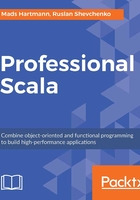
Base Syntax for Expressions
Scala is an expression-based language, which means that everything is an expression (in the right-hand side of function and value/variable definitions).
Some of the base expressions are:
- Primitive expression: Constant or value/variable name.
- Function calls: These can be:
- Usual function calls
f(x, y). - Operator call syntax:
- binary:
x + y.
Note
Any method with an argument can be used as a binary operator. A set of predefined binary operators are similar to Java:
- Usual function calls
- unary:
!x - Constructors:
new xcreates an instance of class x. - Assignments to mutable variables:
y = 3: Assigns a value of3toy.x = 3: This is a compiler error, and a value can't be assigned.
- Block:
{ A; B }The value of a block expression is the last expression. Note that
;can be omitted ifAandBare situated on different lines. The syntax for this is shown as follows:{ A B }
The preceding syntax will have the same output as { A; B }.
- Control structures
ifstatement:> if (1 == 1) "A" else "B" - let's eval one in REPL
- match/case expressions:
> x match { case "Jon" => doSomethingSpecialForJon() case "Joe" => doSomethingSpecialForJoe() case _ => doForAll() } - Loops:
while/dovar i=0 var s=0 while(i < 10) { s = s+i i = i +1 }Do/whileForeach,for
Shortcuts for height-order functions will be described in detail in, Chapter 4, Scala Collections.
We'll look at defining a main function which prints something onscreen and calls the main function.
- You should have already opened
project1. If you haven't, import it into the IDE. - Insert the new method inside the object definition.
- Insert call at the
mainmethod.
The full method should look something like this:
object Chatbot1 {def printHello():Unit = {
println("Hello")}def main(args: Array[String]): Unit = {
printHello() … // unchanged code here
}
}